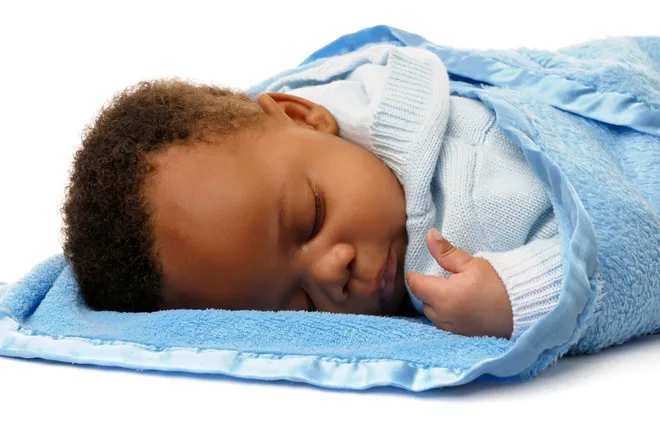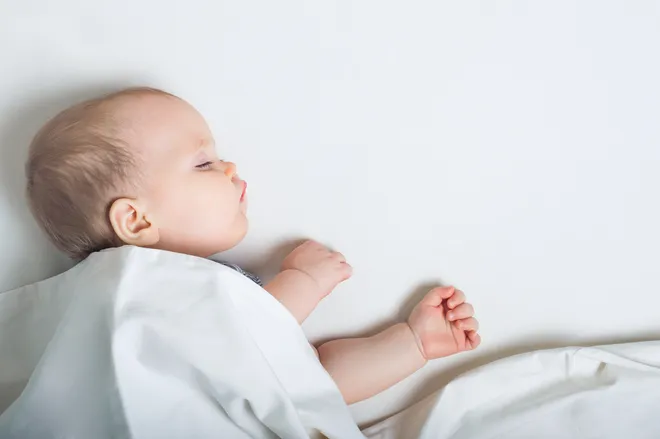Are weighted sleep products safe for babies? Lawmaker questions companies, stores pull sales
A U.S. senator is calling on the Federal Trade Commission to investigate the "seemingly deceptive advertising practices" of two makers of weighted sleep products for infants, while major companies like Amazon and Target have stopped sales of some of the items.
In a Thursday letter to commission Chair Lina Khan, Democratic Sen. Richard Blumenthal of Connecticut specifically called out Dreamland Baby and Nested Bean, saying the companies have refused to address their "broad, unverified safety claims about their products in the face of strong opposition from child safety experts," according to a news release from the lawmaker's office.
“I ask that the commission investigate these companies to determine whether any unlawful, unfair, or deceptive advertising practices are taking place and potentially harming millions of families,” Blumenthal wrote in the letter. "The stakes are simply too high to allow weighted infant sleep products to be advertised as ‘safe,’ especially without a clear disclaimer explaining the lack of an agreed-upon standard for determining safety."
Dreamland Baby, based in Danville, California, and Nested Bean, based in Hudson, Massachusetts, didn't immediately respond to a request for comment from USA TODAY on Friday.

Amazon, Target, Babylist discontinue sales
Amazon has not specified which products it will pull, but it did publish a notice Wednesday that it will prohibit the sale of certain weighted sleep products for infants.
According to Amazon, listings for weighted infant sleep products will be removed if they:
- Refer to an infant, or use terms such as "baby," "newborn," "very young child," or “young child” in product detail page titles, descriptions, bullet points, or images
- Include images of an infant with the product
- Describes the use of weight in their use to aid in better infant sleep or use terms such as "self-soothing," "fall asleep fast," "deeper sleep" or "sleep longer" in product detail page titles, descriptions, bullet points, or images
“In the interest of safety, we informed selling partners on April 9, 2024, that Amazon will no longer allow the sale of weighted infant sleep products in the Amazon store,” an Amazon spokesperson told USA TODAY on Friday.
A Target spokesperson said the retailer is "in the process of working with vendors and manufacturers of the products" and will remove the items from stores and online by the end of the week.
“Out of an abundance of caution, we have decided to voluntarily stop selling weighted baby sleep products as the industry continues to learn more," the retailer said.
Likewise, Babylist confirmed with USA TODAY Friday that it "no longer sells weighted infant sleep products."
"We are constantly reevaluating the merchandise we sell based on available industry guidance and made the decision to remove these from our offerings," a company spokesperson said.

Are weighted sleep sacks safe?
The American Academy of Pediatrics put out a report on evidence-based safe sleep recommendations in 2022 asking that "weighted blankets, weighted sleepers, weighted swaddles, or other weighted objects not be placed on or near the sleeping infant.”
Though Nested Bean's weighted sleeper is advertised to calm "like a hand on your baby's chest" and Dreamland Baby's weighted sleepwear is described as feeling "like a hug," there is concern from pediatricians, consumers and consumer safety advocates that such products could affect an infant's or heart rate.
Rachel Moon, a doctor and chair of the academy's task force on sudden infant death syndrome, outlined the following risks to Consumer Reports:
- Babies' rib cages aren't rigid, so it doesn't take a lot of pressure to create obstruction
- If a baby ends up in an unsafe sleeping position, the pressure of the weighted sacks makes it harder to get out of
- Weighted sleep products could cause suffocation if shifted out of position to cover a baby's mouth or nose
- Weighted sleep products make it tougher for babies to wake up and feed
“In terms of babies who die of SIDS, what we think is happening is that they can’t wake up," she told Consumer Reports. "There’s a problem with their arousal ... We want babies to wake up at night. That is actually protective."
The U.S. Centers for Disease Control and Prevention has a thorough list of safety tips for infant sleep that you can read here.
Disclaimer: The copyright of this article belongs to the original author. Reposting this article is solely for the purpose of information dissemination and does not constitute any investment advice. If there is any infringement, please contact us immediately. We will make corrections or deletions as necessary. Thank you.







